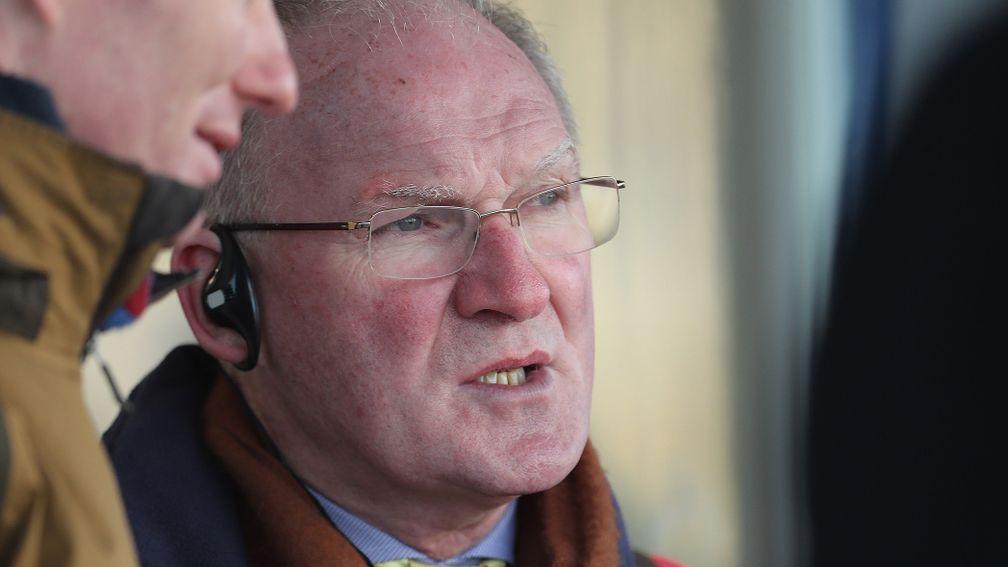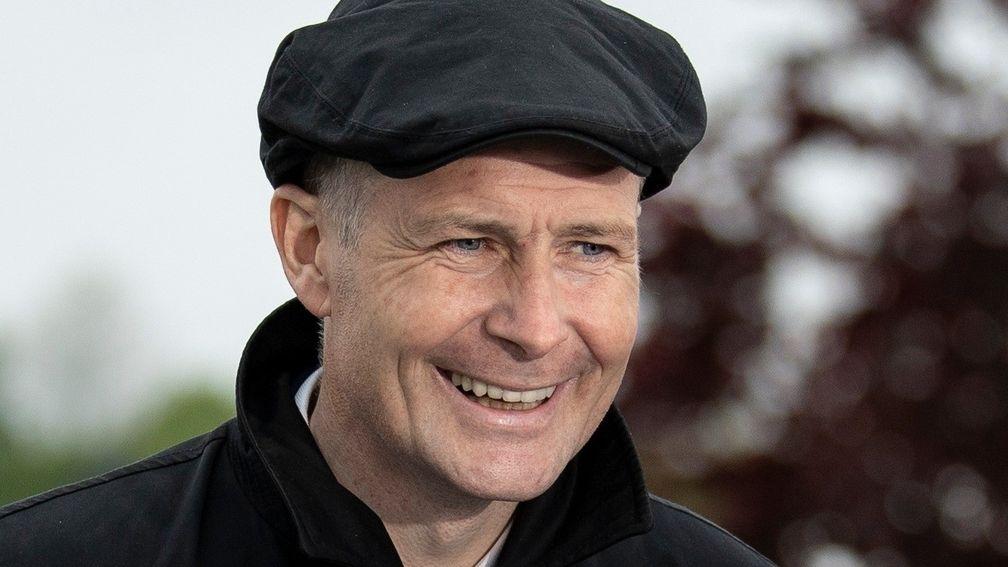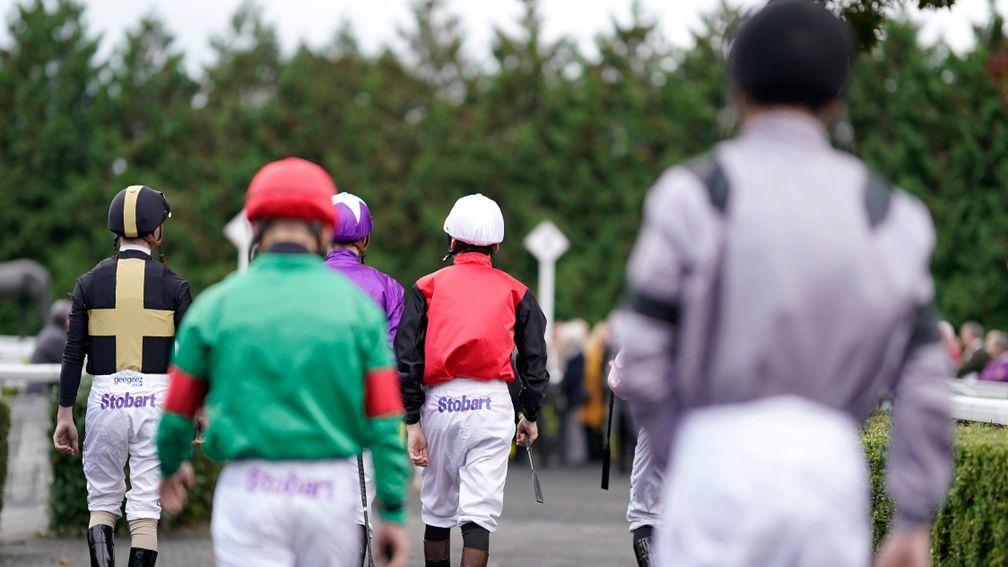European Commission under fire for delays in new jockeys' helmet standards

The European Commission has come under fire from senior medical officers in Britain and Ireland for dragging its feet for five years over approving a new standard for jockeys’ race-riding helmets.
Dr Adrian McGoldrick, who headed the former Irish Turf Club’s medical team for a decade until the end of last year and remains chair of the equestrian committee of the National Standards Authority of Ireland, said on Friday: “We submitted a new draft standard in January this year but have had a stony silence from the EC.”
McGoldrick and others have been trying to get officials in Brussels to take action since October 2014 when, two years after the EC raised formal objections to the standard helmet in general use, reference to it was withdrawn from the official journal of the EU.
He added: “They wouldn’t negotiate with us at the beginning, then we gave them what they wanted but we’ve had no connection since. We have a beautiful draft standard sitting in the EC, but nothing is happening.
“It’s upsetting, particularly because the person in the EC who rejected our last application was not an engineer; he was a helmet salesman.”
McGoldrick was speaking at the International Conference for the Health, Safety & Welfare of Jockeys in Dubai, in a session chaired by the BHA’s chief medical adviser Dr Jerry Hill, who echoed his disappointment at the delay.
Hill said: “We’ve selected the best helmet standards but under EU law we are obliged to put in alternatives. We can’t choose a particular brand or type, so we say to the jockeys that the helmet must be of the best standard and should be professionally and individually fitted.
“The challenge is that we are currently a member of the EU and bound by EU law, but that obliges us to list helmets which, given the choice, we might not want. We have to be commercially neutral but push jockeys in the direction of the best standards."
In a separate presentation to the two-day conference, Hill updated delegates on the BHA’s latest research projects aimed at supporting jockeys, notably a three-year PhD degree course at Bath University, funded by the Racing Foundation.
He said: “We’re looking to analyse and prevent spinal injuries, using videos of falls and setting up under laboratory conditions computer simulation of a moving fall. The intention is to train jockeys to fall differently but also to look at equipment on impact in a fall, to ask whether we can change body protectors in a more intelligent way.”
International jockeys body formed as Pat Smullen named first honorary president
Professional riders are the latest racing industry participants to have the backing of a global organisation, following the formation of the International Federation of Jockeys Associations, with Irish legend Pat Smullen as the first honorary president.
Announcing the creation of the IFJA to delegates in Dubai, Andrew Coonan, secretary to the Irish Jockeys Association, said: “Representatives of six jurisdictions have put together a constitution and got agreement the day before the conference started to go ahead with the launch.”

The arrangement formalises ad hoc meetings held before each conference since it started in 2006, and brings together associations representing Britain, Ireland, France, the US, Australia, India and the Philippines.
Coonan suggested that the grouping would be pressing the International Federation of Horseracing Authorities to introduce a general rise in minimum riding weights and to standardise jockeys’ helmets. “There is compelling evidence to say these issues should be implemented,” he said.
Paul Struthers, chief executive of the Professional Jockeys Association, backed his Irish counterpart but added: “My plea would also be for the harmonisation of drug testing, because different countries have different levels of testing. There’s even a difference between Britain and Ireland over testing for cocaine, for example.
“We want jockeys to be tested fairly and consistently, so that a jockey who tests positively has actually taken the drug and not simply been contaminated inadvertently.”
Struthers added that one of the IFJA’s first initiatives will be to set up a one-stop-shop website for members, advising them on the conditions that apply in different countries.
'Culture has not changed' – more needed to persuade jockeys to adopt new lifestyle habits
Education about healthy eating is no longer enough to persuade jockeys about the benefits of changing their fast-moving, long-hours lifestyle habits, according to Dr Dan Martin, who acts as a performance nutritionist to the Professional Jockeys Association and Injured Jockeys Fund.
He said: “Despite all the recent knowledge, the vision in the weighing room is that starvation and dehydration through sweating are still high on the list of priorities for weight management.

“This is down to three things – lack of knowledge, poor food and catering provision, and the fact the culture has not changed.”
Martin, a post-doctoral researcher at Liverpool John Moores University, added: “There is now a strong body of evidence to show the ill effects of archaic weight-making practices, in addition to chronic low-energy availability through prolonged periods of food and fluid deprivation, on both health and athletic performance.
“Yet knowledge only works to some extent, therefore we need to consider behaviour as well.”
To this end, Martin has devised a project based on behaviour change science, which introduces the notion that to change an individual’s behaviour several aspects other than education need to be considered and included within any potential intervention.
“This model of thinking has been used with success in medical and healthcare interventions, but this is the first within any professional sport,” he said.
The issue of nutrition has also been taken up in Ireland, with the launch in September of the first racecourse catering study, which covered 25 tracks through an audit that scored each out of 44.5 points.
Gillian O’Loughlin, who works as the dietitian manager at Naas general hospital and oversaw the study with help from the Irish Horseracing Regulatory Board, reported that nine courses were identified as requiring intervention from a dietitian or sports nutritionist, scoring less than 50 per cent. Thirteen received a bronze award for a score up to 60 per cent, and two reached silver standard for a score of 75 to 90 per cent. None achieved the gold mark of more than 90 per cent.
O’Loughlin reported “very positive feedback” from racecourses, some of which had already acted on the findings.
Read The Lowdown from 8.30am daily on racingpost.com and the Racing Post app for all the day's going updates, news and tips
Published on 9 November 2019inNews
Last updated 19:40, 8 November 2019
- Merci Olivier! No final winner for Olivier Peslier but the world of racing unites in saluting the end of a great career
- The latest edition of the Racing Post is available to read online now - here's how you can access it
- How Smart View recorded a 76 per cent profit at the Cheltenham Festival
- Smart View is available on the Racing Post app - how to read the revolutionary new racecard
- Levy reform talks 'accelerating' as clock ticks down to April deadline for agreement
- Merci Olivier! No final winner for Olivier Peslier but the world of racing unites in saluting the end of a great career
- The latest edition of the Racing Post is available to read online now - here's how you can access it
- How Smart View recorded a 76 per cent profit at the Cheltenham Festival
- Smart View is available on the Racing Post app - how to read the revolutionary new racecard
- Levy reform talks 'accelerating' as clock ticks down to April deadline for agreement